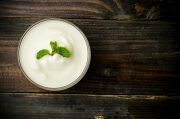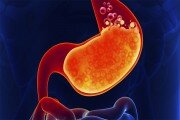IBS Symptoms: Turmeric Can Reduce IBS Attacks…
The healing properties of turmeric (Curcuma longa), a perennial herb and member of the ginger plant family, have been known about by Ayurvedic (ancient Indian) practitioners for many centuries. However, it has only been recently that scientific research has begun to confirm and endorse its multiple health benefits.
Turmeric contains an active ingredient called curcumin, a spicy yellow pigment that is used both for cooking purposes and as a medicine. Curcumin has the ability to help combat a wide range of diseases with proven benefits in the areas of dementia and memory problems, cancer and heart disease.
Now, a new study conducted at the University of Reading has revealed yet another condition turmeric can help treat: Irritable Bowel Syndrome (IBS). Researchers found that standardised turmeric extracts can provide significant relief from the IBS Symptoms such as abdominal pain and flatulence.
This is good news considering that one in five adults suffers from IBS Symptoms in the UK. As well as causing abdominal pain and flatulence, as mentioned earlier, IBS can also trigger abdominal bloating, diarrhoea and/or constipation, and a sudden urgent feeling of needing the toilet straight away as soon as the pain starts.
Far from being simply an annoying condition, IBS can significantly disrupt sufferers’ lives, causing a great deal of anxiety about having to go out without having immediate access to a toilet. It can also be extremely embarrassing for sufferers if they have to suddenly get up in the middle of a meeting or appointment to make an urgent dash for the toilet… leaving friends and colleagues wondering what has happened.
‘…Turmeric extracts can play a role in improving IBS symptoms and health-related quality of life’
The Reading University study involved 207 IBS sufferers, who were otherwise healthy. The researchers then divided the patients into two groups. The first group received a daily supplement of turmeric extract, while the second group were given two tablets of turmeric extract a day instead of one.
At the end of the eight-week study the scientists found that those who were treated with one tablet a day reported a 53 per cent reduction in their IBS symptoms, while those who were given two tablets reported a 60 per cent improvement. This included a reduction in abdominal pain, less frequent bouts of diarrhoea, and an improvement in the patients’ overall quality of life.
Commenting on the findings, lead researcher Dr Rafe Bundy from the University of Reading, says: ‘This study shows that turmeric extracts can play a role in improving IBS symptoms and health-related quality of life in otherwise healthy adults. The results are encouraging for sufferers of this very common condition, and more extensive studies are now warranted. We may decide to experiment on the additional benefits of turmeric mixed with other natural remedies such as artichoke and St John’s Wort, which help improve digestion and relieve anxiety related to IBS symptoms.’
It is thought that turmeric is so effective against IBS because of its well-documented anti-inflammatory action.
Inflammation plays a major role in triggering an IBS attack. Doctors believe that stress, anxiety and food intolerance, in genetically susceptible individuals, causes an inflammatory reaction within the bowel, which results in the production of toxic chemicals such as histamine, TNF-alpha and Interleukin. Researchers have found that turmeric extracts are able to specifically inhibit the production of TNF-alpha and histamine during an inflammatory reaction.
Turmeric fights inflammation and abnormal bowel muscle contractions
Another study performed at the Jack Bell Research Centre, Children and Women’s Hospital in Vancouver, Canada, showed that curcumin, the active ingredient of turmeric, reduces the production of an inflammatory chemical called NF-kappaB.
This chemical is involved in a variety of inflammatory conditions such as arthritis, dementia and bowel disease. The scientists discovered that turmeric is able to reduce inflammation in the lining of the bowel and improve overall bowel health.
Inflammation is not the only change that takes place in the bowel during an IBS attack. The small muscles around the bowel can also become irritated and cause muscle cramps, which is manifested by the sensation of needing to get to a toilet straight away. Scientists from the Department of Pharmacology, Chulalongkorn University in Bangkok, Thailand, have reported that turmeric significantly blocks these abnormal muscle cramps and relaxes the bowel muscles, so helping to improve the movements of the smooth muscle within the bowel.
As mentioned earlier, turmeric is able to block the chemical histamine, which can also cause the small muscles of the bowel to contract abnormally
This dual action, namely turmeric’s ability to reduce bowel inflammation and control abnormal muscle contractions in the bowel, translates into less frequent and less severe IBS attacks. In particular, as the functioning of the bowel becomes more normal following treatment with turmeric, less gas is produced inside the bowel, and fewer cramps and bouts of diarrhoea result.
What to take for best results
The recommended dosage is 500mg of standardised turmeric extract once a day until IBS symptoms improve. The course of treatment may need to be extended to several months at a time.
Did you find this information useful?
Then why not get more expert health recommendations just like this delivered direct to your inbox?
"It is truly refreshing to read a newsletter on the topic of alternative medicine which is scientifically based and reviewed by professionals..." - Robert Sinott
We respect your privacy and will never share your details with anyone else.Sources:
Bundy R, Walker AF, Middleton RW, Booth J. Aliment Pharmacol Ther 2004.
Curcuma longa (turmeric): Monograph. Alt Med Rev 2001, 6 Suppl:S62-66.
Baek OS, Kang OH et al. Clin Chim Acta 2003, 338(1-2)135-141.
Salh B, Assi K, Templeman V et al. Am J Physiol Gastrointest Liver Physiol 2003, 285(1):G235-243.
Itthipanichpong C et al. J Med Thai 2003, 2:S299-309.
Disclaimer: Bear in mind the material contained in this article is provided for information purposes only. We are not addressing anyone’s personal situation. Please consult with your own physician before acting on any recommendations contained herein.
- Comments (7)
- Facebook Comments (0)
Comments are closed.











Excellent information. May God continue to bless you as I have been truly blessed to receive this information. Thank you.
I put 4 heaped teaspoons in my live yoghurt every morning! It really helps but my insides must be bright yellow!
Tumeric is fabulous and I an ever so glad that you are shining the spotlight on it. Thank you for a great site.
This has been used by the Japanese and India for years, they are smarter than
our Food and Beverage dept. because they want us sick all the time
Amit – its the other way round; curcumin extracts are 95% pure curcumin whereas turmeric powder can range between 1-5% curcumin. Though I agree that natural turmeric is a far better choice than the unnatural curcumin extract in which harsh industrial solvents are used, one should make sure to take turmeric powder in higher quantities.
Real turmeric is the yellow powder that is used in India and other asian countries. It is rich in curcumin too. It is used as daily cooking in India. The powder form turmeric will do a whole lot more than tablets which contain little extract.
Please let me know which brand of turmeric tablets is suitable for curing uric acid